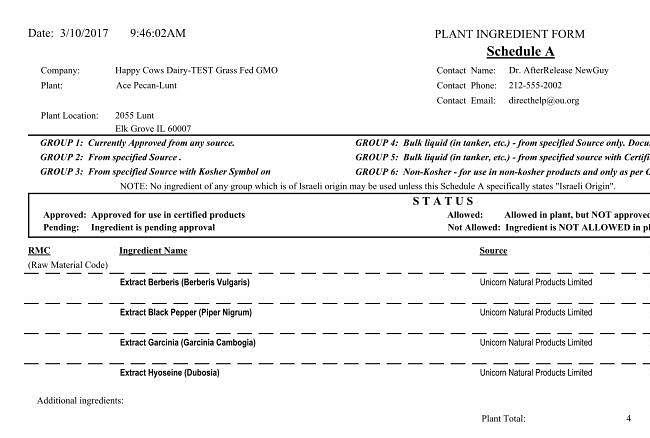Key Administrative Duties and Terms
 OU Kosher–certified companies have two main contact points at the OU: the RC (Rabbinic Coordinator) and the RFR (Rabbinic Field Representative), who reports directly to the RC. Both can help source ingredients, market products and services, and solve problems. In short, they make the kosher production program as smooth and productive as possible. Knowing more about their responsibilities and expertise will help certified companies get the most out of your OU Kosher certification.
OU Kosher–certified companies have two main contact points at the OU: the RC (Rabbinic Coordinator) and the RFR (Rabbinic Field Representative), who reports directly to the RC. Both can help source ingredients, market products and services, and solve problems. In short, they make the kosher production program as smooth and productive as possible. Knowing more about their responsibilities and expertise will help certified companies get the most out of your OU Kosher certification.
The Roll of The Rabbinic Field Representative (RFR)
The RFR (in Hebrew, mashgiach) visits the production facilities as the eyes and ears of the OU Kosher office. His role is to report on changes at the production facility and to verify control systems are in place. In most cases, companies are visited by staff servicing a specific geographic area. In some cases though, the OU Kosher will use someone specializing in an industry or type of production facility.
Using the same person for regular visits allows the development of working relationships. Client companies should feel free to address any questions or concerns about the kosher program to their RFR. Most RFRs are able to assist with input of new ingredients or products or help with using the OU Direct system. Some have extensive production experience and can help with production questions. Some have helped with the sourcing of alternate ingredients.
Unless there are extenuating circumstances, OU visits are not scheduled. Contractually, the RFR is permitted to visit company facilities during normal operating hours. In addition, when needed, RFRs may come during sanitation shifts for kosherizing equipment or other special needs. Companies are required to assign sufficient personnel to facilitate these audits. If there are special circumstances, the RFR and the RC should both be notified.
During the initial evaluation and setup, OU Kosher sends staff who are familiar with the industry. This person (often a senior staff member) evaluates the company and plant for certification. A specialist may be assigned for special koshering or to evaluate changes.
The Role of the Rabbinic Coordinator (Account Manager)
The Rabbinic Coordinator (Account Manager) manages the kosher program and is often a specialist in your industry, especially if it’s complex or the facilities are. For some large companies, a single RC is used to ensure consistent communications.
Often the RC, unlike the RFR, deals with management (as opposed to people on the production floor). Each certified company assigns a primary contact in their office, who makes sure that the RC receives information in a timely manner. He or she is assigned a secure login and password for the OU Direct customer management system. The primary OU Direct user can assign other OU Direct users, such as a billing contact or members of purchasing and sales teams.
Schedule A is the list of ingredients

The Schedule A has various components: 1- the ingredient name; 2- the ingredient supplier; 3- dairy or pareve status; 4- kosher symbol requirements (“Group”); 5- specific requirements for that ingredient.
All of the ingredients that have been approved for each plant are listed in the Schedule A. As long as an ingredient is approved, it can be used in certified products. That said, each plant and product has nuances. Approval of ingredients is often more complex than simply saying the item is or is not kosher to OU standards. For example, the OU will want to make sure that an ingredient is compatible with existing production. So, for example, introducing a dairy ingredient into an otherwise non-dairy facility may have implications for all other production.
It is crucial that ingredients are approved for plant use before they enter the facility. Sometimes, there are complications. For example, not every kosher certification meets OU standards. The RC coordinates the approval process and works with the company if there are issues.
Schedule B consists of approved products
Remember, the RC is there to help avoid problems and find solutions. In consultation with company contacts, he determines the implications of new products on the company’s kosher status. In complex companies, kosher statuses might differ for individual plants or even lines. Even the order of production or cleaning protocols may come into play. RCs often need to review formulas and labels to ensure accuracy and compatibility. Good communication can help avoid problems; for instance, the RC may catch important details like the “D” for Dairy being omitted from a label that needs it. The earlier the OU is involved, the better. Needing to kosher a line because of an easily avoided error may lead to extra expense, downtime or unneeded wear and tear on equipment.
The RC will also determine private label status. In-house labels are company-owned and distributed and included in the OU certification fee. Note that a private label is owned or distributed by a third party and requires its own Private Label Agreement and fee.
Other RC roles
The RC is the liaison between your company and other OU Kosher departments. Do you have a question about billing? Maybe you’re expanding or considering new production? Are you adding a new production facility, merging with another company or adding co-packers? Would you like special training for production and management personnel? Your first stop is always the RC.
The RC and RFR work together and coordinate with others at the OU office to service your kosher needs. Good communications are the cornerstone of good relationships, so please, never hesitate to ask questions and reach out. And if you don’t know or aren’t sure who your RC is, send an email to Phyllis Koegel koegel@ou.org who will help you find the information you need.

